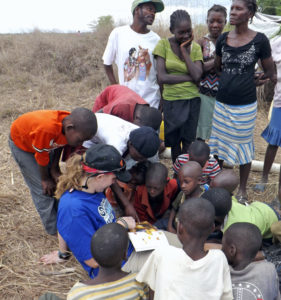By Jenna Ebener
This past April, I was blessed to spend eight days in Pignon, Haiti. I shared this life-changing experience with seven other individuals, three of whom were from Germany.
I went with Haiti Outreach, whose vision is to help Haiti become a developed country in part by increasing access to clean water by building wells. As a result of empowerment and education, 95 percent of the communities they educate on sanitation have latrines and 95 percent of their community wells are still functioning today, as compared to about 50 percent of wells nationwide.

Jenna Ebener works with Haitian children during a visit there in April. She was part of the Haiti Outreach to help empower and educate Haitians.
I immediately fell in love with Haiti Outreach’s sustainable and community-oriented model. Having just received my master of social work, I believe strongly in those two concepts. I wanted to go to Haiti ever since I took a history of Haiti class during my undergraduate education but waited until I found an organization that aligned with those two values. God provided this opportunity for me when I least expected; it could not have come at a more perfect time.
Details fell into place within days and I was able to secure a grant from the Diocese of Davenport Volunteer Program to help fund my trip.
The process begins with a community contacting Haiti Outreach about its interest in getting a well. The community then creates a committee, 50 percent of whom are women. Haiti Outreach educates the community on the importance of sanitation, such as latrines.
Once they drill for water, volunteers work alongside the community to install the pump and build a concrete well house. The community elects a guardian of the well to unlock it two to three hours in the morning and evening. Each family in the community pays a small monthly fee to use the well. The fee is an amount that everyone can afford and the money is put into a local bank.
As a result, when the pump breaks down, the community has money in savings to buy the part and the education to fix the pump on their own. Once the well is ready, the community holds an inauguration ceremony with speeches, songs and skits to teach sanitation rules; pass the keys from the person or organization that funded the well to the committee and then the guardian; and officially unlock the well and pump the water.
Being in Haiti was eye-opening on multiple levels. Haitians are struggling every day to survive, while in America we have the luxury to work towards higher education and employment. Poverty in Haiti is not like poverty here. In America we do not have to worry about walking a mile or more every day just to access water. We do not have to worry that the only water we can access will make us or our children ill or die. We do not wear clothes from other countries with sayings that we cannot even read because those are the only clothes we can access.
One of the biggest ways I recognized the universality of poverty in Haiti was flying over Port-au-Prince, their “big” city. I know when I am in a big city like Chicago because of the size of the buildings, and I know I am getting out of the city when the houses become bigger and more spread out. In Port-au-Prince, I could only tell I was in a big city because the houses were numerous and close together.
In Haiti, the houses are relatively the same, two-room size whether you are in the city or a small village of 300 people. That concept was mind-blowing to me.
Being in a country like Haiti really helped me appreciate the extent of what we have here, such as green grass, pets that are well-fed and loved and clean, running water that I can access whenever I want.
In Pignon, we stayed at a Haiti Outreach guest house. For four days of our trip we rode standing up in the back of a pickup truck dodging branches for an hour and a half on a dirt road to get to the community 15-30 miles away to build the well. When I got back home, I drove the hour and a half ride in my car on a smooth road to get to my school that was 90 miles away… I would not trade the truck ride in Haiti for anything!
(Jenna Ebener graduated last weekend with a master of social work from St. Ambrose University in Davenport.)











